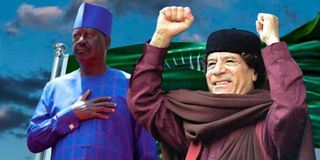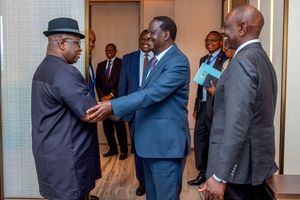
Former Prime Minister Raila Odinga (left) and former Libyan leader Muammar Gaddafi.
Former Prime Minister Raila Odinga's vision for a unified Africa, as he campaigns for the African Union Commission (AUC) chairmanship, echoes the aspirations of former Libyan leader Muammar Gaddafi, who once championed a "United States of Africa" to foster continental solidarity and economic strength.
During his AUC launch in Addis Ababa on Friday, Mr Odinga underscored the need for unity, saying it was sacred to him as he aspires to chair the regional body.
“…I have a broad vision for Africa; of a united and integrated continent that is also prosperous and at peace with itself.
“I believe that the greatest hindrance to Africa’s aspirations is our disunity,” Mr Odinga said in his address on Friday.
Disunity among African states, he noted, has undermined its ability to mobilise resources to catalyse the collective dreams of the continent’s citizens.
“Africa’s unity is therefore sacred to me. We must return unity to the top of our priorities as Mwalimu Nyerere and Nkrumah did. Without unity in a fast-consolidating and changing world, Africa will continue to be marginalised, exploited and irrelevant. It is why today I ask you, Ladies and Gentlemen, to open your minds to a New Africa,” Mr Odinga explained.
Mr Odinga’s vision echoes the aspirations of former Libyan leader Muammar Gaddafi, who once championed a "United States of Africa" to foster continental solidarity and economic strength.
From 1997 onwards, Gaddafi gradually intensified his attempts to push for a United States of Africa.
In July 1999, the Libyan leader attended the 35th Organisation of African Unity (OAU) Summit (Now African Union) in Algiers where he called for greater political and economic integration across the African continent.
Speaking at the summit he said: “…We must create a Pan-African Congress and Integration Bank. The proposed congress would boost the continent’s drive towards unity, while the bank would push forward the process for the implementation of the treaty on the Economic Community of Africa…”
On September 9, 1999, Gaddafi championed the Sirte Declaration that announced the decisions to establish the African Union (AU) in Sirte, Libya; and in July 2000 the AU Constitution was adopted in Lomé Togo, followed by its inauguration in July 2002 in Durban, South Africa to replace the OAU.
The inauguration of the AU marked the beginning of a new phase of the Pan-African struggle to unite the continent.
But will the new push by Mr Odinga bear fruits?
Will the veteran politician succeed where the late Gaddafi failed?
In an interview with the co-chair of Mr Odinga’s campaign secretariat Mr Elkanah Odembo on Sunday, he disclosed that the former Prime Minister “absolutely identifies with Gaddafi’s quest for a United States of Africa.”
“The original OAU was all about having a United States of Africa.
That is something that Raila identifies with and he still believes very strongly that if Africa does not engage with one voice and present itself as a continental bloc, then we don’t stand a chance in the global arena,” said Mr Odembo, Kenya’s former ambassador to the United States.
He went on: “We have the EU, BRICS and if Africa really wants a voice and leverage, and given the resources we have as a continent, we must understand that our strength is in our unity. That is an important agenda for us.”
Mr Odembo explained that Mr Odinga seeks to make it clear to African Heads of State on his bid for a unity of African Nations.
While meeting various AU partners in Addis Ababa on Saturday, Mr Odinga championed the need for full implementation of Africa’s agenda 2063.
“The AU Agenda 2063 stands as one of the most ambitious and forward-thinking regional frameworks, championing Africa’s unity and continental integration. The African Union also has existing frameworks and decisions that guide the Union on parameters of partner engagement including the Draft AU Partnerships, Policy and Strategic Framework (AUPPSF). Guided by these, I will endeavour to strengthen the organisation’s collaboration with partners for our mutual benefit,” said Mr Odinga.
Mr Odembo says that Mr Odinga is expected, beginning next week, to launch a “door-to-door,” campaign plan to meet various Heads of State as his campaigns for the AUC post reach fever pitch ahead of the February 2025 election.
Strategic leaders
“He will be meeting strategic leaders around the continent to send this message across that his agenda, more than anything else, is to work with each one of them individually and in their regional economic communities and collectively at the summit level to implement and accelerate things they have already resolved.”
“You heard him say that almost 95 percent of the resolutions have not been implemented, he wants to remove all those roadblocks by engaging with the individual leaders.”
But Mr Odinga’s interest in pushing for a unified Africa under the "United States of Africa" banner, a concept famously championed by Gaddafi, Mr Odembo says, presents possibilities in today's context.
Gaddafi's ambitious vision for a continent-wide federation faced resistance due to the complexities of aligning diverse political systems, national interests, and economic priorities across Africa.
While he rallied some support, particularly in the African Union, many African leaders were wary of relinquishing national sovereignty and power to a central African authority.
Mr Odinga’s approach, by contrast, Mr Odembo argues, may benefit from recent developments in African diplomacy, such as the African Continental Free Trade Area and enhanced regional blocs, which promote economic integration and cross-border collaboration without fully merging governments.
Mr Odinga is focusing on economic, infrastructure, and policy integration rather than immediate political unification.
However, significant challenges remain, including political differences, economic disparities, and national sovereignty concerns, which continue to complicate the vision of a United States of Africa.




